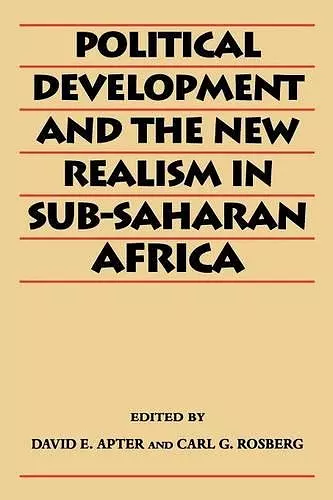Political Development and the New Realism in Sub-Saharan Africa
David E Apter editor Carl G Rosberg editor
Format:Hardback
Publisher:University of Virginia Press
Published:30th Mar '94
Currently unavailable, and unfortunately no date known when it will be back

Since the 1950s David Apter and Carl Rosberg have been among the leading American scholars in African studies. In this volume they, along with other specialists in the field, explore the new configurations of African politics. With tentative efforts at a revival of democracy now taking place, it seems appropriate to reassess the theoretical debates and empirical themes that have characterised postwar Sub-Saharan African politics. Focusing on a ""new realism"" which has emerged among Africanists since the dismantling of colonial rule, the essays are presented as a corrective both to the initial euphoria informing African studies and to the later tendency to place blame for all of Africa's political and economic difficulties on the receding spectre of colonial oppression. In the introductory chapter, Apter and Rosberg point out that Sub-Saharan African has been particularly vulnerable to fluctuating truths and flights of interpretive fancy. No other continent has attracted such multiple layers of power and prejudice from the outside. Judgments and speculations about the very nature of Africanness have been common. Today everything is subject to controversy - race, ethnicity, language, religion, ideology - and all the debates are heated up by severe economic decline and the long-standing, unresolved difficulties of state formation. Crawford Young (University of Wisconsin) examines the role of nationalism in the political awakening of the area and looks at ethnicity as a possible resource rather than an obstacle to state formation. Joel D. Barkan (University of Iowa) identifies the new and emerging issues in civil society and the revival of modernisation theory in a context of accountability, Richard L. Sklar (University of California, Los Angeles) works through the inadequacies of conventional notions of markets and of bourgeoisie and proletariat and shows that neither capitalism nor socialism can be looked to for definitive solutions. Michael F. Lofchie (University of California, Los Angeles) examines the reassertion of neoclassical economic theory and evaluates new policy alternatives designed to correct distortions in African economies. The analysis by Thomas M. Callaghy (University of Pennsylvania) advocates a new balance between the needs of the state for stability and the development need for a market-driven economy. Colin Leys (Queen's University, Kingston, Canada) reviews the arguments for dependency and classical Marxism in the context of Kenya and is concerned with...
ISBN: 9780813914794
Dimensions: unknown
Weight: unknown
384 pages